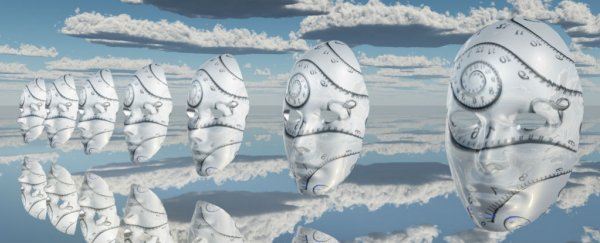If you're one of those people who runs late to everything, you've just been given another excuse: scientists have shown why it's scientifically impossible to make a clock that's perfectly accurate. The bad news is that explaining your excuse isn't going to be easy - it's all down to the fundamental laws of physics, which propose that not all particles in the Universe experience time in the same way.
In Einstein's theory of relativity, the concept of time dilation states that the speed of an object affects time, and so does where it's being observed from. You can now add large accelerations to this disruptive mix as well. Watchmakers can try as hard as they like to put together something that keeps time accurately, but they're never going to get around the fabric of space-time itself.
"Our calculations showed that above certain very large accelerations there simply must be time disorders in the decay of elementary particles," says one of the team, Andrzej Dragan of the University of Warsaw in Poland. "If the disturbances affect fundamental [particle-level] clocks… then any other device built on the principles of quantum field theory will also be disrupted. Therefore, perfectly precise measurements of proper time are no longer possible."
The researchers weren't measuring the time it takes the number 14 bus to get from one side of town to the other: they were looking at elementary particles called muons. While we already know that speed affects the concept of time (if you're watching particles moving at different speeds they'll appear to decay at different rates), the new research suggests that the same distortions are happening at different accelerations.
The scientists' results, published in the journal Classical and Quantum Gravity, match a prediction made in the 1970s by Canadian physicist William Unruh. Essentially, it posits that an observer's acceleration affects the number of particles he or she can see, and if that's true, then these particles are decaying at different rates - in other words, not experiencing time in the same way.
And unlike previous work based largely on hypothetical conditions, the researchers say their hypotheses could apply in the here and now. "We show that for problems with the measurements of space-time to arise… extreme conditions are not needed at all," says Dragan. "Time, and therefore space, most likely cease to be accurately measurable even in today's Universe, provided that we try to carry out the measurements in systems moving with great acceleration."
If you've got questions, don't worry - so do the scientists. Are the discrepancies caused by our measurement methods, what we're trying to measure, or by the nature of time itself? As yet, no one's quite sure.
"If our predictions are confirmed experimentally, many things related to our understanding of space-time, the passage of time, and its measurement methods will have to be rethought from scratch. It could be… interesting," says Dragan.
